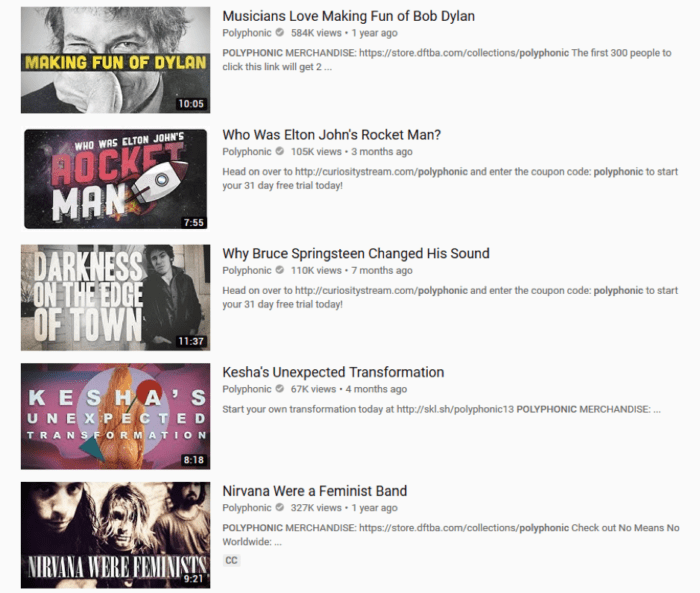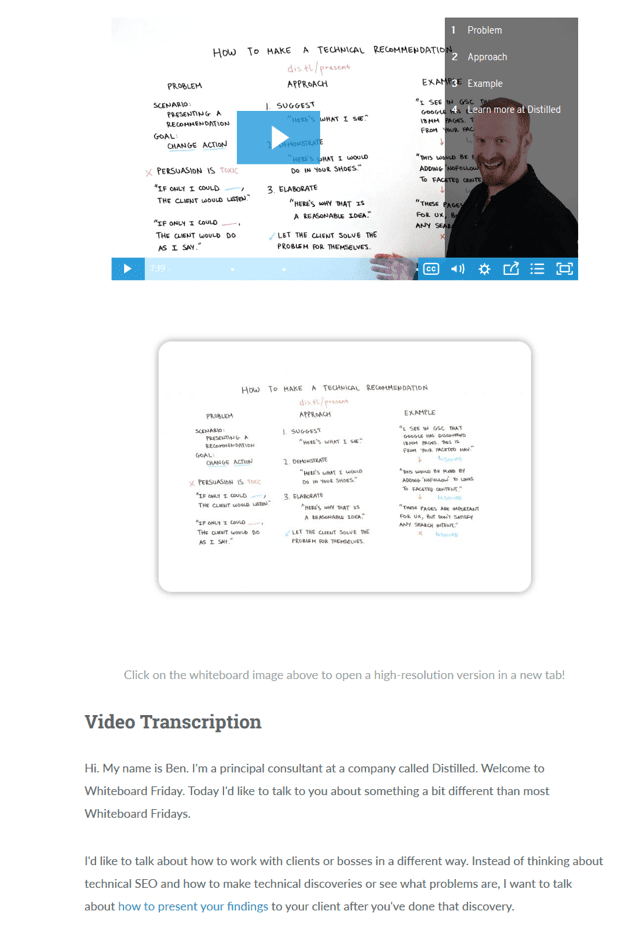The success of your video marketing strategy often lies in the details you overlook
No one would be surprised to learn that videos have become an essential marketing tool across all industries.
We’ve been experiencing sustained growth in demand for video content for quite some time now and you can see it all around. Consumers interact more with it, social platforms are switching to video-first approaches, and companies of all sizes are jumping onto the video bandwagon.
Recent research projects that videos account for 78% of all mobile data traffic this year alone, a single data point on a long list of stats that evidence video content’s relevance. Add to those the fact that about 500 hours of video content gets uploaded on YouTube each hour and you can see that most people are on the same page.
All that means that even though the audience is there, anyone trying to get noticed in today’s video-saturated world has a tough job ahead of them.
Creating quality videos is a significant first step, but you need to pair them with every SEO trick in the business to have that charming whiteboard animation or brand new testimonial reaching your audience.
Pick the right home for your videos
Whenever marketers or business owners get a shiny new video in their hands, they often rush to upload it on YouTube and share it from there. And that’s fair enough – Google’s video platform is, after all, the second biggest search engine on the planet.
So, chances are, your target audience is there… somewhere.
The problem, though, is that focusing exclusively on YouTube will have you missing a bunch of opportunities along the way.
Consider your goals for the piece and think of other platforms that might suit those goals better. Platforms like Vimeo, DailyMotion, or Veoh have all particular strengths that warrant looking into – less competition being the obvious one. But how about natively uploading your video on the social platform you plan to use the most?
Native content on sites like Facebook, Twitter, and Instagram are displayed more prominently in result pages than shared/embedded ones. That’s a simple advantage that can shoot your video’s reach potential through the roof.

Meaningful titles, useful descriptions
I know what you are thinking, these are two of the most common SEO elements to consider when uploading a vid and are found on any SEO tips list. And yes, that’s true. The underlying idea is that people find content through keywords, so, by all means, go right ahead and include those keywords in your titles and descriptions.
But, is that it?
Titles and descriptions are there to do so much more than just serve as keyword holders!
Take titles, for example. Your audience might be looking for a particular video, say, about how to make their smartphone’s battery last longer. They’ll probably use keywords like “battery,” “duration,” “how-to,” and the smartphone’s model. If you had a video that addressed that issue, you might as well go with a keyword-packed title like “How to increase your smartphone battery duration.”
That sounds fine and all, and it does work for some people.
However, you should always try to come up with creative, compelling titles that appeal to humans as much as they do to search algorithms. Titles that tug at your audience’s curiosity and needs. After all, “Quick and simple hacks to extend your battery life” is probably going to perform better in the eyes of your audience.
As for descriptions, they are hardly there just to describe your video’s content!
Yes, do provide a brief summary. But once that’s out of the way, move on to recommend your other pieces of content. Include effective CTAs to motivate viewers to take further actions. Heck, even include a list of places online where people can reach out and find you.
You’ve got some space, so you might as well put it to good use!
Be very picky with thumbnails
Thumbnails are one of those things that people often neglect when uploading their videos – a problem made worse since platforms started offering to pick or auto-generate them for their users.
Pro tip: Letting an algorithm choose your video’s thumbnails for you? Not a good move.
Why? Even above titles, thumbnails are often the first point of contact users have with your content. If you have a lousy one, chances are they will be the only point of contact.
Thumbnails should be attention-grabbing, engaging, and entice people to click on the video to discover more. Do you know that saying about not judging books by their cover? Probably made up by someone whose book had an ugly one.
So, here are a couple of elements to account for when creating your thumbnails:
- Colorful imagery
- Human presence
- Text
Colorful images ensure your thumbnail will be eye-catching enough as not to get lost in the sea of scrolling results. A human presence takes advantage of the fact that people are psychologically drawn to images that feature people in them. Lastly, you can use more text to repeat or expand your title and say even more about your video. For example:

Subtitles and transcripts
Have you ever scrolled through your Facebook or Twitter timeline and gotten your attention piqued by a vid you can’t hear at the moment? Maybe you are in a noisy place and can’t hear, or in a real quiet one with no headphones around…
It is a situation that speaks to a lot of mobile users most often than not. So much so that companies and savvy marketers are starting to include subtitles and transcripts as a baseline part of their content.
Not only does having transcripts and subtitles contribute to your SEO by including a bunch of your keywords in text form, but it’s also an excellent practice for accessibility.
If, for whatever reason, developing subs for your entire video is a problem, at least do so for the beginning part. That way, you’ll have text going along your video’s preview and hopefully engage the viewer enough to have them click through and watch the whole thing.
Then there’s transcripts and the SEO advantage they provide, but there’s also an accessibility angle to consider. By having a full transcript, you are giving your audience an alternative way to consume your content (not to mention also making it searchable). That just goes to provide further value, which is a win all around.
But hey, don’t take my word for it. See how SEO experts do it:

Make the most out of your video content through intelligent placement
People are watching more video content now than ever before, and that trend’s graphic keeps ticking up. Meaning that you probably want to keep your video content in your marketing spotlight.
What’s the spotlight? First and foremost, your website. Since people will end up there eventually to learn more about what you offer, featuring your videos in prominent spots of your website is vital. However, that’s not to say that all your videos should be treated equally, or that they all have the same potential.
The best way to utilize your video content in your marketing wheel is to pick a handful of them to place strategically in pages like your home, about us, and most importantly, funnel landing pages. In fact, using a video per landing page is a Google-approved technique that you should definitely follow.
Picking a video for these places can be a little bit challenging, as you should choose the ones that are among your top-performers or the ones that fit the page’s purpose best. For instance, using an explainer video for a landing page of your battery improvement app would be relevant, informative, and provide value to visitors.
Each situation might call for different types of videos, and that can make the whole “using video effectively” in your marketing a bit daunting. Just keep in mind there are plenty of resources and skilled video companies out there that can help you figure it out!
Just make sure to match the right video content with the right pages, and you’ll be golden.
Remember that video SEO is still SEO
Video-focused optimization is critical to get your content ranking and improve its reach. But you shouldn’t forget that this shouldn’t come without an already sensible general SEO strategy. Meaning that you shouldn’t ignore more traditional practices like page optimization, load speeds, metadata, etc.
But those are just “the usual suspects.”
You should also keep in mind that new SEO trends pop up regularly. Things like voice searching and mobile-first indexing can be utilized to give your audience more avenues to find your video content.
So, keep a finger on the pulse of optimization developments, and test those that you feel can give your video content an edge. Most of the time, you won’t walk away disappointed.
Wrapping up
Video SEO might be just a piece in your whole marketing strategy, but it’s definitely one worth investing time into. As a leading type of marketing content, ensuring your videos reach a larger crowd will result in better returns for your efforts.
Take your time to figure out the best combination of technical aspects, strategic decisions, new tech advancements, and changing habits necessary to have your videos reach their audience. Every bit counts, especially in such a competitive arena!
However, do remember that SEO (video or otherwise) isn’t a one-time thing – it’s an ever-evolving aspect of creating and sharing content. In that light, you’ll definitely need to revise and adjust your strategy periodically to guarantee long-term performance.
So, what are you waiting for? It’s time to implement these tips and start bringing your excellent video content in front of more people’s eyes.
